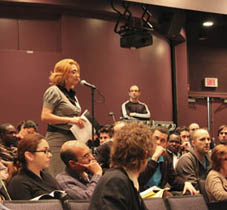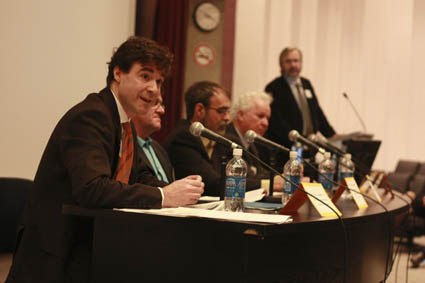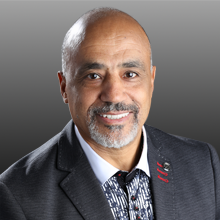Nouvelles
The 3rd Graduate Careers Forum panel: the challenges of a career in industry research
On February 16, a panel discussion on the challenges of working as an industry researcher was held as part of Polytechnique's 3rd Graduate Careers Forum. The four invited panellists, experts in their respective fields, looked at this potential career path from the standpoint of industry expectations -- and produced some interesting observations.
Moderated by Yanick Villedieu, radio host and journalist for the popular Radio-Canada science program Les Années lumière, the panel touched on a wide range of topics: scientific and technical issues, the types of assignments a researcher might expect to receive, the role of research in industry and what it takes to be the ideal candidate.
Panellists with a focus on real-world issues
Gilbert Drouin, president and CEO of
Valorisation-Recherche-Québec from 1999 to 2006, underscored the "product-oriented" nature of industrial research. He also
stressed the need for tomorrow's researchers to be versatile and able to align with the company's business strategy. Drouin
acknowledged that striking the right balance can be difficult, but said that today's companies are making an effort to learn
how best to use the available resources.
For Jean-Yves Huot, product development manager at 5N Plus Inc. (a pure compounds and metals producer), communication is
vital. There's no one-size-fits-all model: "You bring to the table what you have to offer as a researcher." Being a good
communicator, making complex concepts accessible, and working to deadline and within budget are all key skills.
Gaétan Lantagne, scientific director of the Institut de recherche d'Hydro-Québec (IREQ), emphasized the importance of being able to spot and assess trends. With industry research so closely aligned with market needs, companies seek candidates whose expertise has both depth and breadth. In today's competitive knowledge economy, good economic reflexes and an understanding of the principles of intellectual property are further assets.
Éric Laurendeau, head of R&D at Bombardier Aerospace, sees hiring graduates as a real advantage, especially if they've studied in Québec. Noting that it would take Bombardier at least seven years to train an independent researcher, he said he feels that graduates have a better grasp of scientific processes. Other value-added factors that can help them find their niche include their social involvement and experience as part of a university research chair.
Laying the myth of the mad scientist to rest
The panellists were unanimous on one point: the absolute
need to see oneself as part of a team. More than ever, tomorrow's researchers must become a resource on which management can
rely. Companies seek candidates with leadership qualities who can adapt to change and work autonomously within a corporate
framework.
Two recurring themes in the discussion were the environment and development, an indication of future research concerns. The
panel wrapped up on an encouraging note, asking students to think carefully about their futures and stay in school as long as
possible before making the jump to industry.
The discussion set the stage for the rest of the Forum, where students had a chance to browse the information booths and meet
representatives from 15 companies. The event ended with a wine-and-cheese networking event in an informal, friendly jazz-tinged
atmosphere.
Congratulations to the Forum's organizing committee!

From left to right: Éric Laurendeau, Bombardier Aéronautique, Gaétan Lantagne, IREQ, Jean-Yves Huot, 5N Plus inc.,
Gilbert Drouin and Yanick Villedieu.




